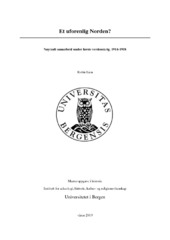Et uforenlig Norden? Nøytralt samarbeid under første verdenskrig, 1914-1918
Master thesis
Permanent lenke
https://hdl.handle.net/1956/19856Utgivelsesdato
2019-06-05Metadata
Vis full innførselSamlinger
- Master theses [240]
Sammendrag
Under conflicts preceding the First World War, neutrals have on several occasions acted in unison to collectively enforce their neutral rights, and to insure their commerce at sea. Even in the form of armed neutrality leagues have non-belligerents strived to protect their interests during wartime. This pattern did not repeat itself during the First World War. This thesis aims to explore why the Nordic neutrals did not follow this pattern when confronted with the violations brought upon them by the total war. Based primarily on primary sources, this thesis will present examples of cooperative neutrality and attempts at cooperative neutrality between 1914 and 1918. Historians have not devoted much resources to answer why a collective block of neutrals did not materialize itself during the Great War. In the case of the Scandinavian countries, this solution to belligerent pressure has been deemed unattainable due to the nation’s separate interests. This thesis will by no means try to disprove this consensus. However, it will attempt to shed more light on the matter. By analysing the separate initiatives put forward by the Nordic governments and by the private sphere, it will unveil that the pattern of previous collective enforcement was attempted, before it was hindered from getting repeated. With the downfall of international law as context, this thesis will show that there were many contributing factors to the failure of Scandinavian, neutral cooperation during the war. By itself, the total war created circumstances which forced different neutral interests to the surface, leaving a poor foundation for any form of cooperation to be built upon. This divide between the Nordic countries was further illuminated by the belligerent’s own interpretation of international law. Beside this presentation of a disunited Scandinavia; continuous pressure from the Entente Powers on neutral cooperative attempts, the general development of the war and the United States attitude towards collective enforcement of neutral rights, are presented as contributing factors to why the Scandinavian countries never effectively united themselves with the aim to protect their neutral rights during the war.
